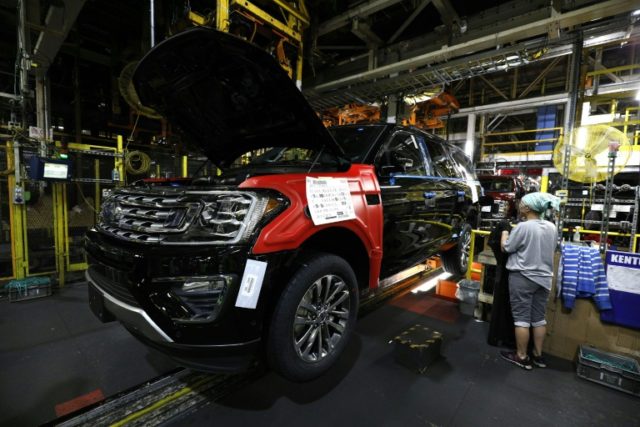Washington (AFP) – The US manufacturing sector’s growth rate slowed again in April as concerns about trade disputes and rising prices worsened, according to an industry survey released Tuesday.
New orders, output and employment all slowed, while prices rose to the highest level in seven years, the Institute for Supply Management said in its monthly survey.
While 17 of the 18 industries surveyed continued to report growth, ISM’s monthly Purchasing Manager’s Index fell another two points to 57.3 percent, slowing more than economists had expected.
And the production index fell 3.8 points to 58.2 percent, below 60 for the first time in 10 months. Any reading above 50 percent signals growth.
“Labor constraints and supply chain disruptions continue to prevent or limit maximum production potential,” said Timothy Fiore, chair of ISM’s Manufacturing Business Survey committee.
“Demand remains robust but the nation’s employment resources and supply chains continue to struggle.”
The survey also revealed price increases in 17 of 18 industry sectors, with over 61 percent of respondents reporting paying higher prices. The price index rose again to 79.3 percent.
Meanwhile, the employment index dropped 3.1 points to 54.2 percent, still growing but at a slower pace, with companies “struggling to hire skilled workers.”
“Many respondents continue to see the labor market as a constraint to their production and their suppliers’ production,” Fiore said.
– Business planning at a ‘standstill’ –
Even companies with strong orders report problems finding workers and drivers to deliver them.
Manufacturers who expressed concerns about the US steel and aluminum tariffs last month right after they were enacted are continuing to feel the impact on prices.
“The recent steel tariffs have made it difficult to source material and we have had to eliminate two products due to availability and cost of raw material,” one company said.
Another said the “tariffs are very concerning. Business planning is at a standstill until they are resolved.”
Fiore last month attributed the jump in the price index to the tariffs President Donald Trump imposed on metals in March, which pushed prices up even before they took effect.
Trump granted temporary exemptions from the tariffs for Canada, Mexico, the European Union and full exemptions for South Korea, Australia, Argentina and Brazil which agreed to reduce exports.
It remains to be seen how that will affect prices.
Analysts had expected a slowdown in manufacturing growth, which they said had peaked, and pointed to the trade fears as the cause of the slightly weaker report.
“Relatively cold and snowy weather likely hurt a bit but the bigger story, we think, is uneasiness over tariffs, which might be inducing a bit of caution,” Ian Shepherdson of Pantheon Macroeconomics said in a research note.

COMMENTS
Please let us know if you're having issues with commenting.